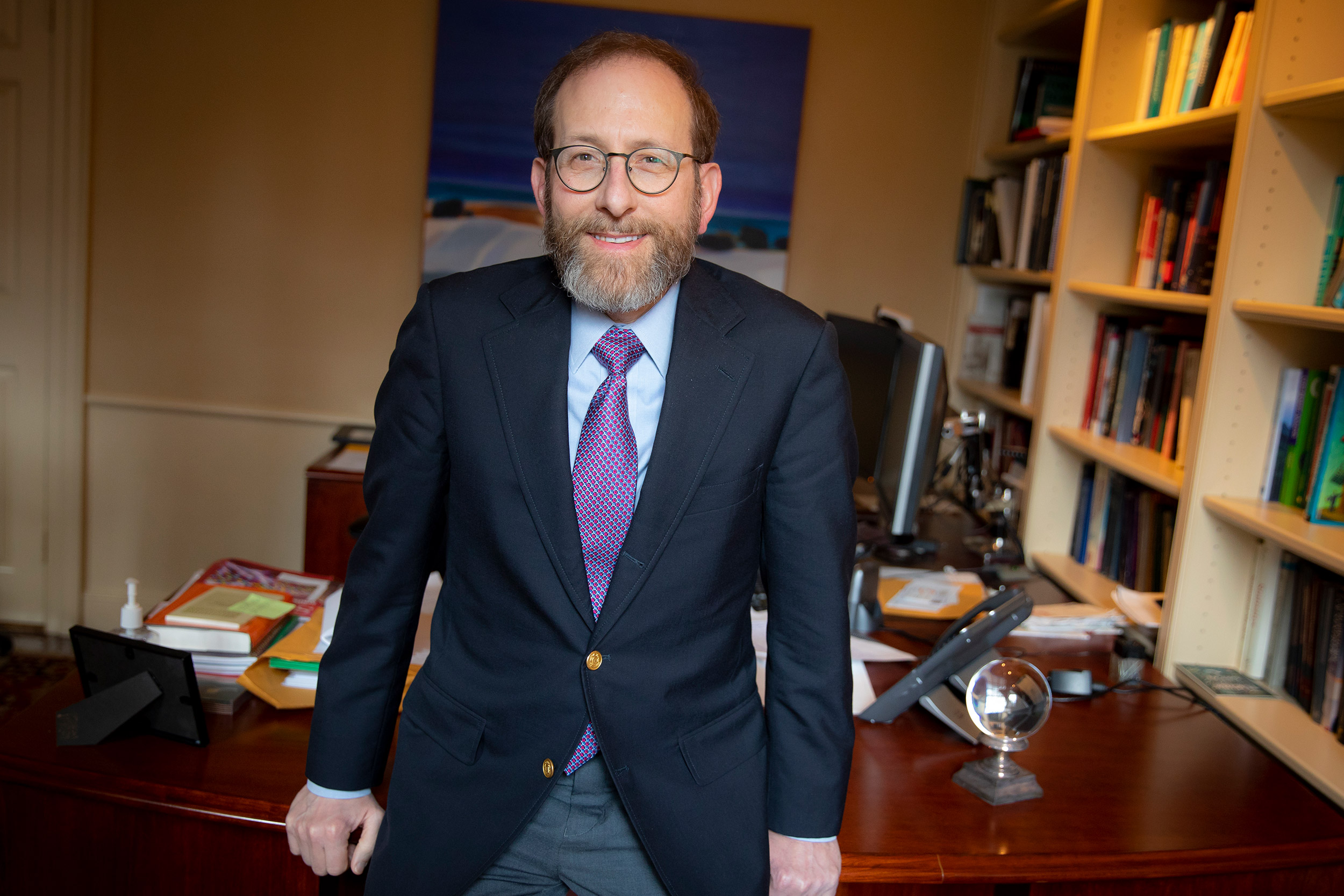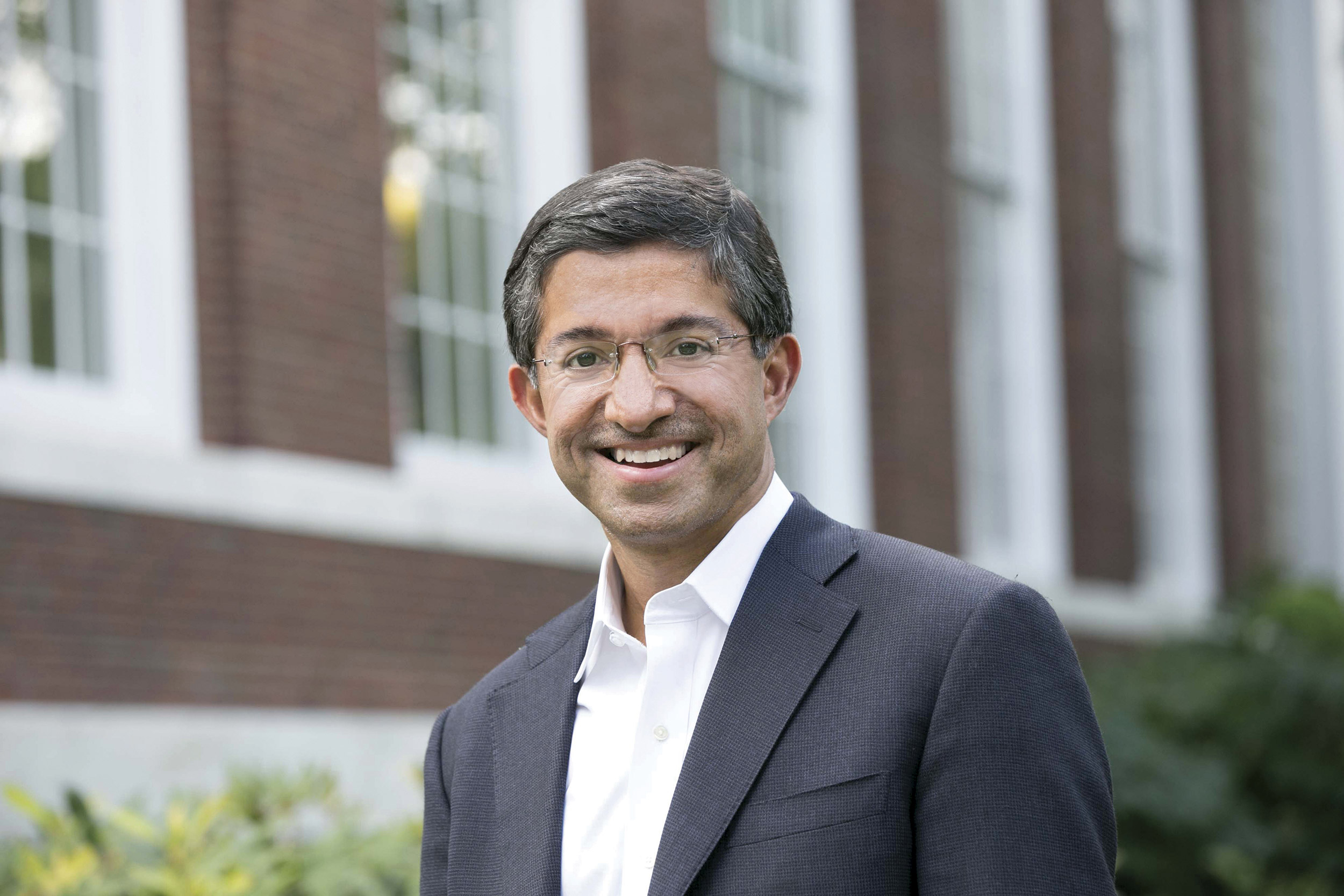
File photos by Rose Lincoln/Harvard Staff Photographer; Christopher Harting/MIT
Harvard and MIT-led nonprofit to tackle longstanding inequities in education
edX acquired by education technology company 2U; proceeds to be invested in nonprofit
Today, Harvard, the Massachusetts Institute of Technology, and edX announced a joint effort with education technology company 2U to further the reach and impact of online learning across the world.
Under the agreement, edX will be converted to a public benefit entity that is fully owned and operated by 2U. 2U will use its resources to grow the online learning platform with the speed, and at the scale, that learners need today.
The proceeds of the acquisition will be used by a nonprofit led by Harvard and MIT that will focus on closing the learning and opportunity gap through the development of new partnerships, digital tools, and strategies. The nonprofit will devote significant resources to forging partnerships with institutions of higher education, particularly community colleges and other educational institutions that serve under-resourced communities. It will also seek to partner with other nonprofit organizations to tackle longstanding inequities in education, and with enterprises and governments to address workforce reskilling needs, while advancing learning experience platforms and research in all these areas.
The Gazette spoke with Alan M. Garber, provost, who is co-chair of the board of directors of edX, a position he’s held since edX began, and Bharat Anand, vice provost for advances in learning, who is also a member of the edX board of directors, to learn more about the context that led to these developments, and to discuss how Harvard hopes to help build a more equitable future through the work of the nonprofit.
Q&A
Alan Garber and Bharat Anand
GAZETTE: edX has been a successful venture over the course of its nine years in existence. Remind us of how it came to be and how far it has come in such a short time.
ALAN GARBER: Harvard and MIT started edX in 2012 as massive open online courses (MOOCs) were just taking off, and when we were exploring how best to use promising technology platforms to improve learning and expand access to educational content.
The mission of edX from the beginning was to make courses from the world’s best universities available to everybody who had an internet connection. We also aimed to develop strategies to enhance residential education with these new online technologies, and we sought to conduct research that would support evidence-based approaches to improve learning.
Over the course of nine years, edX has had widespread impact. It has grown tremendously. It now offers more than 2,800 courses from 194 partner universities, educating more than 39 million learners worldwide to date. Several countries have also leveraged the open edX open-source learning platform as part of their educational strategy.
GAZETTE: Tell us why now was the right time to decide to pursue this effort with MIT and 2U.
GARBER: Since we launched edX, approaches to teaching and learning at large scale have diversified and grown, and enjoyed remarkable success. Enrollment in edX courses boomed during the pandemic, which focused even more attention on the value and potential of high-quality online learning. Taking full advantage of that potential will require capital investments at greater scale than is readily attainable for a nonprofit entity like edX.
During this time, the economic disparities and social inequities that plague our world have also continued to expand. The change in ownership will enable the mission of edX — including access to low-cost and free courses to meet the needs of diverse learners — to be carried out with continued innovation at a greater scale.
“The mission of edX from the beginning was to make courses from the world’s best universities available to everybody who had an internet connection,” said Alan Garber.
Rose Lincoln/Harvard file photo

GAZETTE: How will this change in ownership enable access to more diverse learners?
GARBER: Currently, a very large fraction of edX’s course completers — and this is also true for other EdTech providers such as Coursera — are individuals who have college degrees. Our data have shown that these platforms have provided an effective way for those who are already well-educated to continue their learning. Now, we are aiming to expand access beyond this group through two main avenues.
First is through the ongoing curation of edX by 2U. edX has done well for nearly a decade, and it’s something that we’re very proud of. It became evident, though, that as for-profit players in this space invested ever-increasing resources into their offerings and their technological platforms, edX risked falling behind. 2U has the resources to invest in new platforms and in marketing in ways that edX hasn’t been able to do as a nonprofit. This means 2U also has the ability to grow the platform into an entity that reaches even more learners and in new and innovative ways.
Of course, we conducted an extensive diligence process before deciding to move forward with an acquisition of edX by 2U, which has widespread experience collaborating with institutions of higher education. They have committed to continuing the mission of edX — in fact, this is spelled out in our agreements with them — and we’re confident it is the right company to take edX to the next level.
The second way in which we will tackle inequities in education is through our collaboration on the nonprofit with MIT. The nonprofit will address this critical issue through research and through partnerships with universities and community colleges and other educational organizations that work directly with learners, many of whom may be disadvantaged.
GAZETTE: What more can you tell us about the mission of the nonprofit?
BHARAT ANAND: The nonprofit will pursue three broad objectives: maximize the impact of online learning experiences for learners everywhere, with particular focus on under-resourced and historically disadvantaged communities; partner with a range of organizations to help prepare the workforce for the future; and develop next-generation learning experience platforms.
Through these activities, the nonprofit will expand the emphasis that Harvard and MIT have placed on edX to date, from high-quality content production and providing broad access (which 2U will continue to focus on through edX) toward high-quality learning experiences and targeted impact.
Of course, we don’t claim to have all the answers. The task of transforming the landscape of education is a massive, multigenerational one that will require close collaboration with those organizations working most closely with the learners we want to reach. Harvard and MIT have an obligation to share our considerable resources with the rest of the world and we intend to do so through the nonprofit.
“The nonprofit will support research to learn more about the barriers that disadvantaged communities face in being able to take full advantage of online learning platforms …,” explained Bharat Anand.
Photo by Evgenia Eliseeva

GAZETTE: Can you provide us with the motivation behind the partnerships that the nonprofit will aim to establish?
ANAND: Impactful learning requires more than creating high-quality content on online platforms. It requires enabling discovery, providing learner support, facilitating credit, and measuring learning outcomes. In other words, content production needs to be well-integrated with those organizations that provide such “last mile” presence and support.
The same applies to workforce reskilling for the future. The nonprofit will facilitate partnerships between higher education institutions and private, nonprofit, and public sector organizations to create scalable “future of work” models, explore the effectiveness of different interventions in a rigorous way, and disseminate learnings.
We need to transform adult education and lifelong learning for a broad swath of learners who are being impacted by forces such as globalization and technological innovation.
Harvard already has various partnerships in place, through our Graduate School for Education, initiatives like the Future of Work, and programs through other Harvard Schools, with organizations that are working to address inequities in educational opportunities and workforce development. We’re hopeful that the nonprofit will expand upon these types of efforts, through new collaborations that start here in Cambridge and Boston, and which extend to other parts of the country and throughout the world.
GAZETTE: What do you mean by next-generation learning experience platforms, and how might they lead to more high-quality experiences for a different, and more diverse, population of learners?
ANAND: You know, we’ve learned a whole lot by now about online learning at Harvard and elsewhere. A decade ago, online platforms were designed with the purpose of hosting content for delivery at scale. Since then, we’ve learned how to design for much more immersive social learning experiences. The nonprofit will work to advance the development of platforms — including some used at Harvard and MIT — that successfully incorporate evidence-based pedagogical principles.
How can we design learning experiences that spark curiosity, infuse confidence, and inspire learning? How can learning platforms enable personalization, build connections, and facilitate multimodal formats — in-person or virtual, live or asynchronous? Questions around pedagogy and platforms go hand-in-hand, and present profoundly exciting opportunities. More than anything, we need to design and deploy platforms that ensure we can meet more learners where they are, so that everyone can have access to new technologies online. The nonprofit will support research to learn more about the barriers that disadvantaged communities face in being able to take full advantage of online learning platforms, such as language barriers, bandwidth, and cultural biases in design, and develop actionable strategies to address them.
We’ve also learned quite a bit more since the pandemic began. It’s been an unprecedented, challenging time for all of us. But some pretty remarkable things have happened too that otherwise wouldn’t have happened so quickly. Educators, and learners, were forced to think differently and to innovate. Here at Harvard, there has been so much creative energy that has gone into this re-envisioning of teaching and learning. Faculty learned that new possibilities arise when our classrooms are no longer bound by constraints on time and location.
Over the past six months, the Future of Teaching and Learning Task Force, convened with the support of Provost Garber and President [Larry] Bacow, has brought individuals from across the University’s Schools and units to systematically explore how Harvard can build upon the creativity, experiments, and inventions our faculty applied to their teaching during the pandemic throughout the University and its global community as we move forward.
GAZETTE: Anything else you’d like to add?
GARBER: I’m looking forward to this next chapter of our partnership with MIT to reimagine learning. Over the years that we have worked together on edX, and much else, we have built up a great deal of trust and mutual respect. Of course, Harvard’s strengths complement MIT’s in this mission, such as their innovation in open-source software and our strong Graduate School of Education, online learning advancements, and policy programs.
Perhaps most importantly, though, is the fact that we’re largely interested in the same things, and our overall goal remains the same: to improve learning and to make compelling educational opportunities available to people of all backgrounds who have a hunger to learn.




